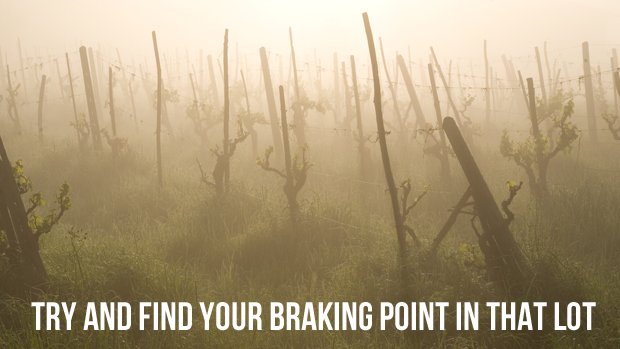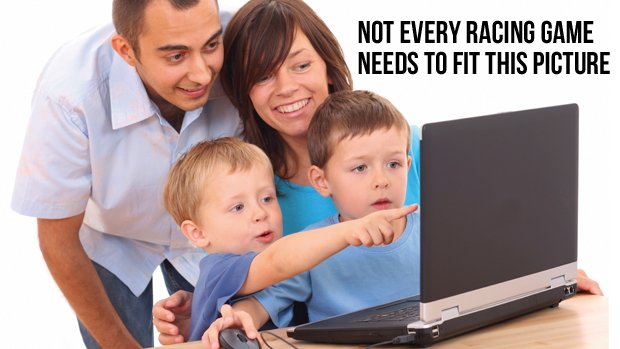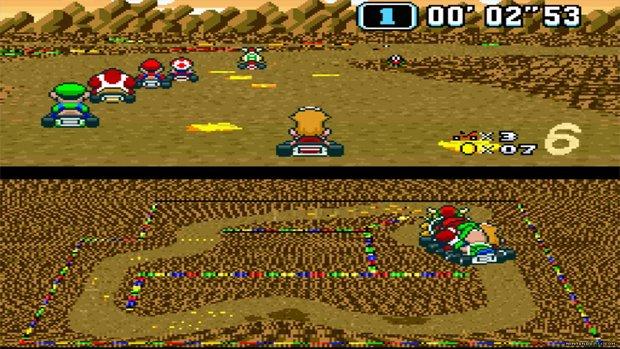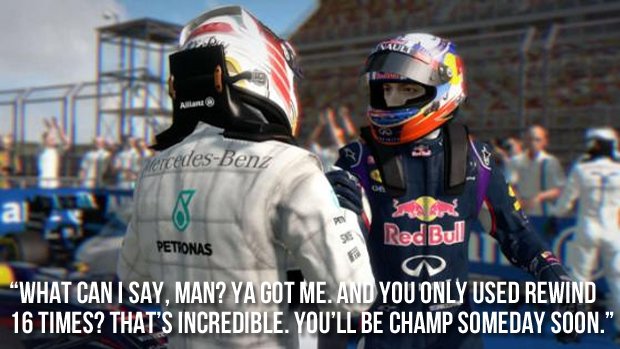Why the racing genre needs to be more hardcore
Before I begin, let's clear up one common misconception: 'hardcore' does not necessarily mean 'hard' as in 'difficult'. Casual games can be difficult. Perhaps the best explanation is that hardcore games demand a greater understanding of how they work and more discipline on the player's part to get the most out of them. And in terms of racing games, that means more than just holding down accelerate and steering. It means involvement, as opposed to passively consuming the on-screen action. The original Super Mario Kart on SNES is hardcore. Gran Turismo 6 is hardcore. GRID Autosport can be hardcore. Indeed, most track-based racing games are hardcore (or at least can be configured to be) but they're sidelined because of the stigma attached to them. And that's exactly where I want to start...
I heard an awful thing the other day. Someone actually described a track-based racer as a 'corridor racer'. Ugh. What a disgusting, belittling way to describe one of gaming's most enduring and quality-rich staples. I assume they are inferring the track is like a corridor because you're constrained by barriers on either side. This sort of labeling plants damaging seeds of negativity, just as the phrase "it's too arcadey" did before it. And this thinking is only being cultivated by developers, resulting in the emergence of a different kind of racing game, particularly by the leaders in the field. Quite literally 'in the field' in the case of Forza Horizon 2, where you can take a supercar through a vineyard, smashing through the vines like they're made of cardboard.

You can flip the car and continue your race. You can hit oncoming traffic and it only feels like a glancing blow. You can even cut out a corner in the road completely by pointing towards the next checkpoint and tearing up the turf. Sounds like an arcade racer, doesn't it? But it isn't. Not quite. It's still dressed up as 'Forza the simulation'. I'd argue it's actually 'Forza the please-don't-get-frustrated-and-stop-playing' casual game. Yes, I did just use the 'C' word. By taking out the need to drive on the road or worry about hitting other cars, you hold the gas, you take in the views, you rewind if that doesn't work out. Essentially, it's a casual racing experience. A very good one, but casual nonetheless.
But Playground Games isn't alone in dumbing down driving, nor is it to blame. Forza Horizon 2 is just the latest in a string of ever-less involved racing games. The change in Nintendo is abundantly obvious, which is particularly telling considering the experiences it offered some 20 years ago were just as family-friendly as they are now. Frustration never used to be a problem because everyone just learned to be better. But today, frustration is interpreted by some as being a sign that the game in question isn't very good. Nintendo appears terrified people might stop playing because they 'can't do it'. I appreciate sometimes people want a game the whole family can play together, and that's perfectly fine. But since not every game is going to fit that bill, why dumb it down for everyone else?

Look at Mario Kart 8 compared to the original Super Mario Kart on SNES. By today's standards, the latter is a super-hardcore driving game, where margin for error is tiny, hazards are everywhere and deviating from the smooth track surface by even the smallest amount sees you floundering as the rest of the field disappears into the distance (with, I might add, no rubber-banding to let you catch up again). It's incredibly punishing and demands absolute mastery of your kart's controls. Yet it was massively successful when it was released, both critically and commercially. There is no way Nintendo would release a Mario Kart like it today.

By comparison, Mario Kart 8 is a round-edged, safety-foam-covered child's plaything that it's impossible to hurt yourself on. It's still a high quality game, of course it is. And it's hard to win on the highest skill level. But look at how little the trackside grass slows you down. How wide the tracks are compared to the SNES game. How slow the Kart is actually travelling when you look at the scenery gliding by. How much more time you are given to react to oncoming hazards.
If a game that was seen as casual on its release is now the epitome of hardcore kart racing, it's only because everyone has moved towards this hand-holding together. And somehow we have arrived at a place where a racing game can begin with automatic braking enabled. Automatic braking destroys a racing game because braking is the game. It's not about how fast you go, it's about how little you can slow down.
Sign up to the GamesRadar+ Newsletter
Weekly digests, tales from the communities you love, and more
Someone asked me 'how do you go so fast?' I replied 'don't brake as much'. It was a joke. Of course the trick is actually to brake more. To slow the car properly so that you exit the corner carrying more speed. And that's something that most modern racing devs have completely forgotten. Or, more accurately, elected to ignore. Some racers not only offer automatic braking, but even steering assistance. Who is this for? Why not just watch the demo?

It's funny how far some of the frustration-relieving features have been taken, with undeniably impressive results. First introduced to racing games in GRID, the time-bending 'rewind' mulligan has been copied by everything from Formula One to WRC. If you try an overtaking move and end up flipping into a ditch, you only have to hit Y and have another go. Sure, it means you get to enjoy spectacular crashes even more (because they essentially mean nothing), but is the gameplay any more involving as a result? No. Instead, you can all-too-easily find yourself in a dull cycle of rewinding the same section, to the point where it starts to get silly. And any win won't feel half as gratifying. It's hollow. You didn't earn it.
Do-or-die moves of real motor racing are the reason racing games exist in the first place. Games are supposed to enable you to emulate that glory, that excitement. Hakkinen daring to take Eau Rouge flat-out to pass Schumi, or the two Williams almost banging wheels at the end of Hangar Straight in 1987. Mansell passing Berger around the outside of the Curva Peraltada in Mexico. The greatest racing moments often carry the biggest risk.
The really annoying thing is, there are quite a few driving games being released right now. And several of them are hardcore, at least when you set them to their most realistic settings. But they still feel like they're 'for the petrol heads'. They're niche. Segregated. Labelled as 'hardcore', almost apologetically. They target driving fanatics instead of bringing hardcore racing to the masses like games did in the past. I know I'm showing my age, but Super Monaco GP was a simulation at heart, yet looked and felt so good, it was a must for most game collections. Maybe Driveclub will bring hardcore gameplay back to the mainstream. There is a chance--it is, after all, a brand new title with limitless possibilities, and it'll have a version on PS Plus too, so it will be more easily accessible than most racers. I sincerely hope so.
Racing games don't have to be hyper-realistic. The best, arguably, are not. But the best racing games are the ones where you have to drive the car better to do better. Super Mario Kart, Sega Rally, Daytona USA, Gran Turismo 3... Are those games accessible and enjoyable from the start for players of all skill levels? Certainly. Fiendishly difficult and deceptively deep if you actually want to win? Hell, yes. We're all getting lazy because we're being encouraged... nay, conditioned, to believe that laziness is normal. I say it's destroying the genre.
Justin was a GamesRadar staffer for 10 years but is now a freelancer, musician and videographer. He's big on retro, Sega and racing games (especially retro Sega racing games) and currently also writes for Play Magazine, Traxion.gg, PC Gamer and TopTenReviews, as well as running his own YouTube channel. Having learned to love all platforms equally after Sega left the hardware industry (sniff), his favourite games include Christmas NiGHTS into Dreams, Zelda BotW, Sea of Thieves, Sega Rally Championship and Treasure Island Dizzy.



